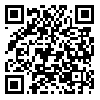BibTeX | RIS | EndNote | Medlars | ProCite | Reference Manager | RefWorks
Send citation to:
URL: http://journal.muq.ac.ir/article-1-827-en.html
2- Department of Psychology, Faculty of Literature & Humanities, Urmia University, Urmia, Iran.
Background and Objectives: Anxiety has a significant impact on academic and social performance as well as quality of life. The present study was conducted to investigate the relationship between brain/behavioral systems and difficulties in emotion regulation with cognitive and physical aspects of social anxiety.
Methods: In this descriptive-correlational study, 306 students were selected from the student population of the Urmia University using multistage cluster sampling. Data collection was performed using measuring scales of social anxiety dimensions, behavioral activation and inhibition system, and difficulties in emotion regulation. Data were analyzed using descriptive indicators, correlation, simultaneous multiple regression analysis, and t-test analysis.
Results: In this study, there was a significant positive correlation between behavioral inhibition system and social anxiety dimensions (p<0.001), Also, examination of the relationships of difficulties in emotion regulation and social anxiety indicated a significant positive correlation between difficulties in emotion regulation and social anxiety (p<0.001). In the comparison between women and men in terms of social anxiety components, both groups were different in cognitive dimension of social anxiety, so that the women obtained higher scores than men in the cognitive dimensions.
Conclusion: According to the results of this study, individual differences in using negative emotion regulation strategies and personality traits play an important role in the onset and maintenance of anxiety.
Received: 2016/05/12 | Accepted: 2016/06/23 | Published: 2017/07/19
| Rights and permissions | |
 |
This work is licensed under a Creative Commons Attribution-NonCommercial 4.0 International License. |







